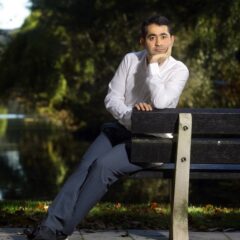
Ali Vahidi
Ali Vahidi has worked in the Department of Engineering Structures at the Faculty of Civil Engineering and Geosciences at TU Delft since 2017. His research focuses on practical innovations and solutions to enhance circularity in construction.
Ali Vahidi recently stepped down as a Delta columnist, but now that his country Iran has been drawn into a war, he felt compelled to write this letter. He calls on academia in the Netherlands to draw a red line.
Many universities expect all PhD candidates, regardless of discipline or research type, to finish within four years. This can harm both researchers and the quality of their work, Ali Vahidi states in his last column for Delta.
Working towards diversity should be more than ticking boxes, says Ali Vahidi. Academics should be selected for their ability to enrich their subject area and to teach others to deal with others ethically and respectfully.
By hiding their struggles, academics increase isolation, anxiety, and feelings of inadequacy, making it harder to seek help and deepening their challenges, writes Ali Vahidi. He pleads for an environment where honest dialogue is encouraged.
Columnist Ali Vahidi is concerned about screening based on nationality at Dutch universities. He knows many colleagues who fear the impact of this policy on their research, while rectors and academic institutions do not seem to question this injustice.
The culture in parts of TU Delft can vary greatly, Ali Vahidi observes. This can lead to feelings of insecurity among people on temporary contracts as they don’t know the desired norms and often don’t have the time to adapt. He believes there is room for improvement.
It is crucial that advisory and consultation bodies highlight the reality faced by the university community, thinks Ali Vahidi. To ensure transparency and accountability, advisory and participation outputs should be stored on the TU Delft employees’ portal.
Any form of anti-social behaviour, no matter how small, deserves immediate attention, writes columnist Ali Vahidi. “Passivity gives people who exploit the system the signal that they can do whatever they want without consequences.”
Really improving social safety requires listening to hidden voices, especially those pushed out or choosing silence, writes our new columnist Ali Vahidi. This avoids superficial measures that do not work.
The pervasive silence about social safety issues within our academic community exacerbates the problem, Ali Vahidi writes in this letter to the editor. “By failing to address our own defects, we cast doubt on our ability to effectively influence society and solve global problems.”

